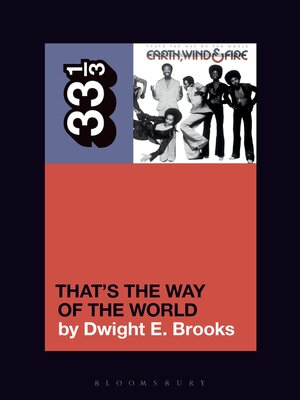
Sign up to save your library
With an OverDrive account, you can save your favorite libraries for at-a-glance information about availability. Find out more about OverDrive accounts.
Find this title in Libby, the library reading app by OverDrive.



Search for a digital library with this title
Title found at these libraries:
| Library Name | Distance |
|---|---|
| Loading... |
Dwight E. Brooks deep dives into Earth, Wind & Fire's That's The Way of the World. Alongside interview material from members Phillip Bailey and Verdine White, he analyses how this album shattered musical barriers, transcended genres, and paid homage to African and American traditions.
Understanding TTWOTW requires appreciating EWF founder Maurice White's multifaceted vision for his band. White created a band that performed various styles of music that sought to uplift humanity. His musicians personified a new form of Black masculinity rooted in dignity that embraced diverse spiritualities and healthy living. A complete understanding of TTWOTW also necessitates an awareness of American racial dynamics and changes in the popular music industry in the 1960s and '70s.
EWF's landmark album TTWOTW presented hopeful messages about the world that were sorely needed at the time. TTWOTW did not tell listeners exactly how to live, but instead how they can live in a quest for self-actualization. The songs encourage us to yearn, learn, love, see, listen, and feel happy. If art can help mold a better future, than EWF's musical legacy of positivity and self-empowerment will continue to contribute to personal growth and social change even as their melodies linger.
Understanding TTWOTW requires appreciating EWF founder Maurice White's multifaceted vision for his band. White created a band that performed various styles of music that sought to uplift humanity. His musicians personified a new form of Black masculinity rooted in dignity that embraced diverse spiritualities and healthy living. A complete understanding of TTWOTW also necessitates an awareness of American racial dynamics and changes in the popular music industry in the 1960s and '70s.
EWF's landmark album TTWOTW presented hopeful messages about the world that were sorely needed at the time. TTWOTW did not tell listeners exactly how to live, but instead how they can live in a quest for self-actualization. The songs encourage us to yearn, learn, love, see, listen, and feel happy. If art can help mold a better future, than EWF's musical legacy of positivity and self-empowerment will continue to contribute to personal growth and social change even as their melodies linger.







